Questioner: Who is a Guru? I’ve heard a guru is like a GPS. Can we progress without a Guru?
Mohanji: Thank you very much for inviting me and thank you very much for this opportunity. My gratitude to the Healing Our Earth team and all of you.
About the question about guru – I follow the tradition of Lord Dattatreya who had 24 gurus. When somebody asked Dattatreya, “Who are you?”, he said, “I am just a worshipper of nature”. So, the fundamental is that anything and everything around us is teaching us something. And the greatest and the highest Guru is life itself – life gives you lessons.
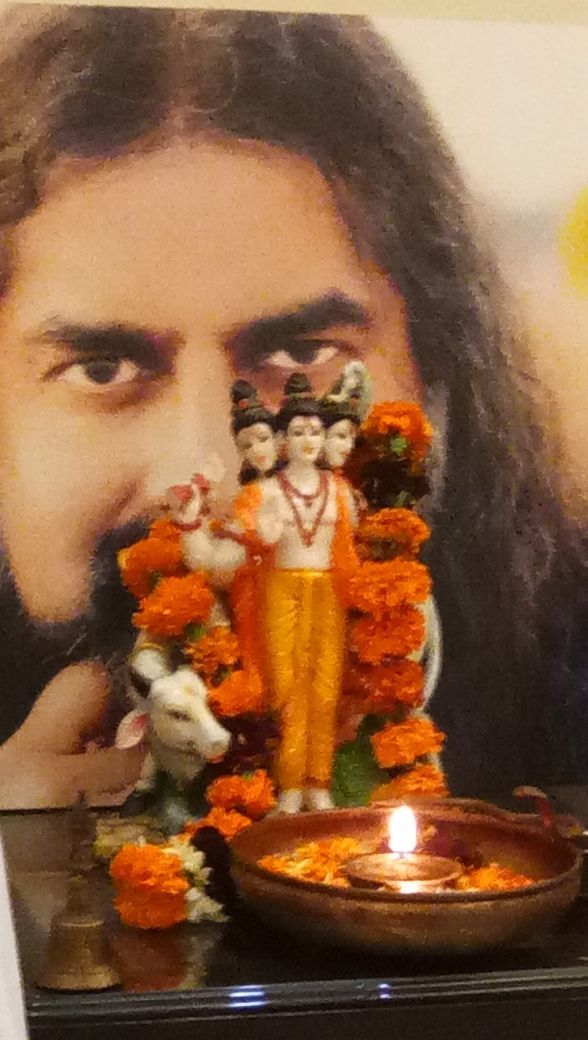
And if you consider 24 hours, we have three distinct dimensions that we go through without any choice:
1) One is the waking state where we interact with the world outside. We gather experiences and we project ourselves into the world (and as per our projection we get experiences).
2) Then we enter into a state of the dreams, the dream state where we completely shut off the world outside, close the eyes and then go within the world inside. Then what we process here is from what we have collected and stored.
3) Then that is also shut down when we enter into a deep sleep state where we completely nullify all the experiences.
So when awareness is connected to the physical level, we have the waking state.
When awareness is connected to mind-matter (which is mind, intellect, and ego where mind processes emotions, intellect processes information and ego processes things connected to ownership), when we connect to that mind-matter and become fully immersed in that, then what comes alive is what is stored by these faculties inside.
And then we connect to the consciousness aspect when we have deep sleep, and we don’t know whether we are a man or a woman. We don’t know the time or space, we are completely not accessible to this world, and we don’t have the world to access.
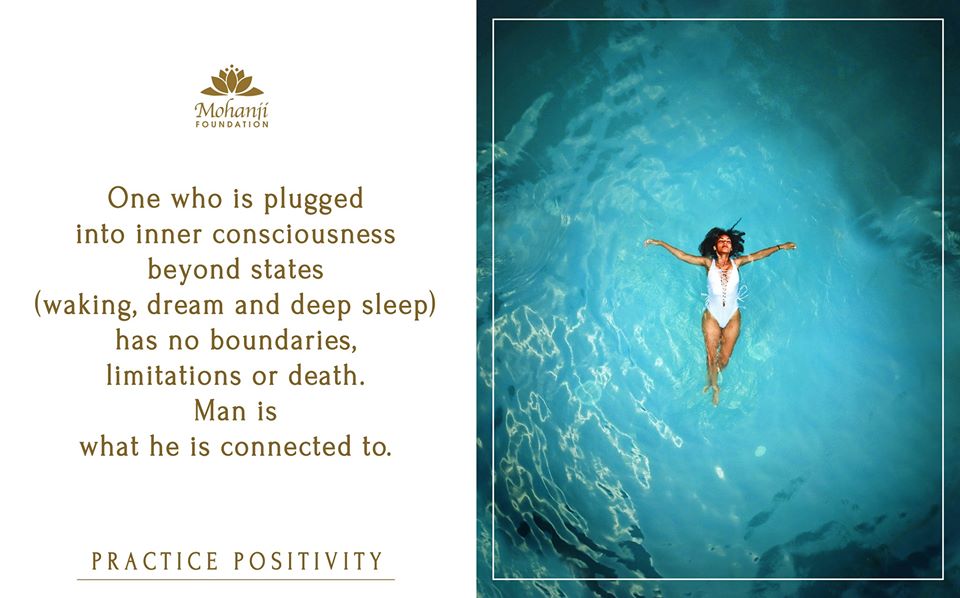
We take a rebirth again every morning – we come back. So we go through this process, almost like a pattern. And then we decide that we are this personality that we have projected in the world. We are also trying to figure out what we are in this world, based on our positions and possessions.
So at some point in time, we realize that this is not really giving us the whole satisfaction – we are actually roaming around for pleasures.
At some point in time we realize there is something permanent and perpetual. That’s a time when we start associating – that the first level of physical, second level of mind-matter and then the third level of consciousness : that it has got these three states, we start thinking about it. It is called manana, not dhyana (meditation), it’s contemplation. That is why various masters have time and again repeated that it is important to contemplate, not meditate. Meditation will happen spontaneously but contemplation is very, very important. The more you contemplate, the more you realize that there is somebody witnessing the whole show. And then it is a quest for knowing who is the permanent, unshakable witnessing this whole show and is always unattached. So this question happens inside. And then we start going within. And it’s an inner journey, it’s definitely not an outside journey.
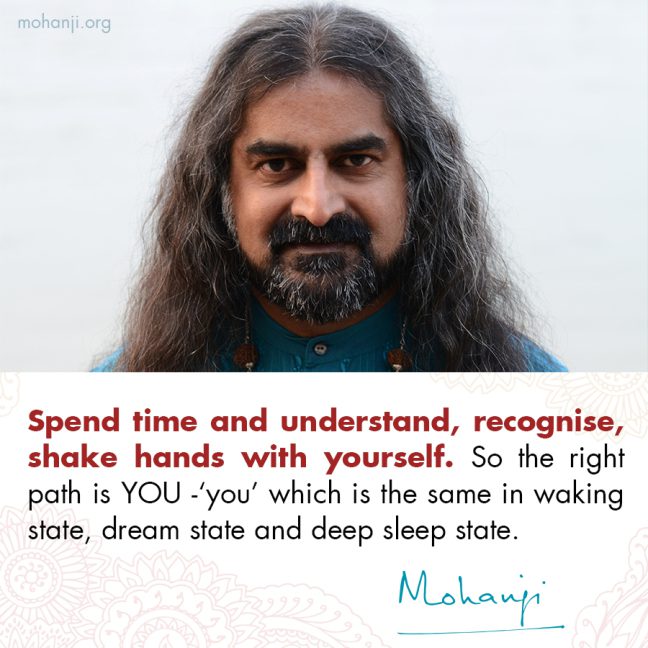
So as far as the tradition that I follow is concerned, you’ve got to find yourself, and that’s the whole thing. When the student asked the teacher, “I can’t really understand all these scriptures – Vedas, Upanishads, Puranas, Shrutis, Smritis, and 33 crore Gods! I can’t really go through all this. I can’t understand. Tell me in one word what this whole story is”.
The teacher said, “YOU! You are the whole story. Tat Tvam Asi”. (You are that)
Then the quest is to find this You, who is actually making all this experience possible. That’s the way the connection happens.
So the Dattatreya tradition has great masters like Sai Baba who everybody knows. He lived as a fakir and a Sufi saint. And though he was living in one place, his energy and power radiated in several places. As a perfect avadhoota, he had fully turned inward the faculties like mind, intellect and ego, and started finding himself. And then he finally found the soul aspect, the atma tattva, stabilized there and settled down. Then what you see outside is your own reflection everywhere. So all the leaves, plants, trees, people, animals, birds, everything gives you a lesson. Because you see yourself in everything. And then you become one with the whole universe. So this is the guru principle that we are talking about.
Guru is definitely not just a human being. Of course we talk about Lord Krishna, as jagath (world) guru. Definitely because he lived the detachment. What he lived for is valid even now, because he was in everything and he was in nothing. Perfect detachment. So like that, there have been masters who time and again came and displayed the possibility of existing without boundaries and full freedom.
Freedom means freedom from the senses and mind, not freedom of the senses. We have misunderstood this concept too much. When we talk about freedom, we talk about freedom to do anything we like to do or to say whatever we like, that in society we can be ourselves as we are. That is not freedom. That is just an expression of patterns. What freedom is, is the freedom from senses and mind where we do not have any kind of binding to anything around. So this is exactly the freedom which the masters have lived, and expressed.
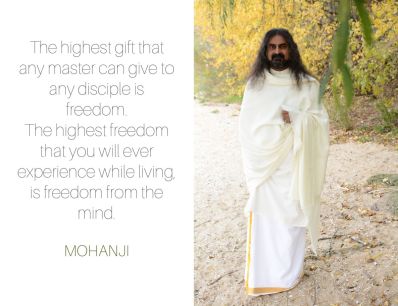
Now when you talk about guru principle, the job of the guru was to live it and the job of the disciple was to connect to that principle of freedom and walk towards it, inside. Go within and find yourself. So this takes time. In my earlier days, I used to go to the Himalayas quite often when I was working in a company as well. And I was trying to find out this me and it took a long time. I did not have a personal guru at that time, but I connected to my spine – being aware of the spine when I’m walking, when I’m doing things, I’m still aware of the spine. And then automatically things started shifting, awareness started shifting, it took me many years. But the point I’m trying to tell is that if you really want to find your guru, you have to find yourself. If you have found yourself, you found the guru. Then everything around is your guru. All the gurus brighten up when you brighten up. So this is already sitting inside. So that is why Tat Tvam Asi has a lot of value. That means, this is the fundamental principle of all the scriptures. If everything were put together and crushed and a juice made out of it all, you get one thing called You. That is the final thing you can get.
When we walk this path, don’t think it will be easy – because our patterns have become too strong. We have been used to so many things, we have been literally entertaining ourselves and our patterns for a long period of time. And we have forgotten that we are bound by patterns, bound by concepts, bound by prejudices. When we look at a person we decide that we don’t like him, or we like him. This is all connected to how we see the world. Basically, there are no enemies, there are no friends, it’s just as it is, and the world is as it is. We all have our space, we all have our relevance, our activity, we have to do something here and all that we are doing is projecting ourselves to the world and getting it back. That is what we are doing. But once you start assimilating yourself, once you find yourself, then you stop projecting, as there’s nothing to project. Instead you start reflecting like a mirror, you will be like a mirror. When somebody comes in front, you reflect that without prejudices, without expectations, without any kind of flavors – as it is. So that makes you a perfect master, total reflection. That is why great masters like Haidakhan Baba said, “When you come to me with anger, I become anger. When you come to me with love, I become love”. That means that you do not have flavors to project, instead you are being a reflection of the whole world, and that is a very sincere reflection, there’s no flavor. And that is consistent, no change. So when you become like that, you become like a huge magnet because you have no flavors. You become every flavor, you are everybody, you’re everything! There is no discrimination, you see the atma tattva in everything, the soul particle, the soul aspect factor which is in all things, and you connect to that – no barrier. So this is exactly what the soul principle is. And that is exactly what the guru principle is.
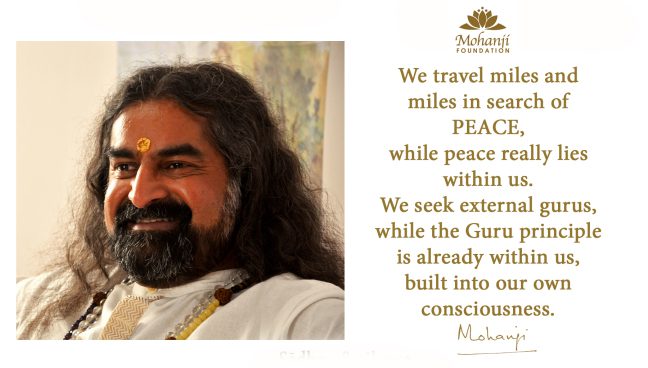
On Guru Purnima day, all I would like to tell you that whatever you are searching for is already within. And when you realize that, it is called self-realization. The realization is only of what you already have and what you realize at some point in time is that you have it. So that’s very simple, and all you need to do to achieve that is to spend time with yourself, not in books, not in rituals, not in activities, not with people. You’ve got to find time for yourself, assimilate yourself. For all that you need to accept yourself. Most of us have a big problem accepting ourselves. We judge ourselves, criticize ourselves, we doubt ourselves. And that creates the distance between ourselves and us. We find it difficult to come within because our acceptance is conditional for ourselves. And then the same thing gets reflected in society – you don’t accept everybody, then we don’t accept situations either. And then we sometimes have a lot of opinions. The world is full of opinions, but we have to go beyond opinions and realize the truth. Opinions are flavored because they are situational, and they are a play of duality. But reality is totally detached from opinions. So we got to really cut out all this, these kind of fringes. And then you come inside. And then you feel okay : ‘I’m complete as it is, I’m unique. I’m neither higher, nor lower or equal to anybody. I’m unique, and this is exactly what I’m supposed to express in this world, nothing more’. And then you start connecting to yourself.
So total acceptance is the first step, and complete liberation is the result. Thank you very much.
Questioner: My god, that was so enlightening. My eyes were glued on your eyes, trying to focus on this message. My question for others. Freedom from senses and mind is one of the most difficult things to go through. How would you recommend this for individuals to go through?
Mohanji: Thanks very much. The first step is always acceptance, self-acceptance, self-respect, self-love. See, the most criticized person in our life is ourselves by ourselves! We judge ourselves, we compare ourselves, and we criticize ourselves when we try to compete with other people, and then we dilute our uniqueness in that way, and that’s the detrimental factor. We say – I am not good enough because of X number of reasons – this is not true.
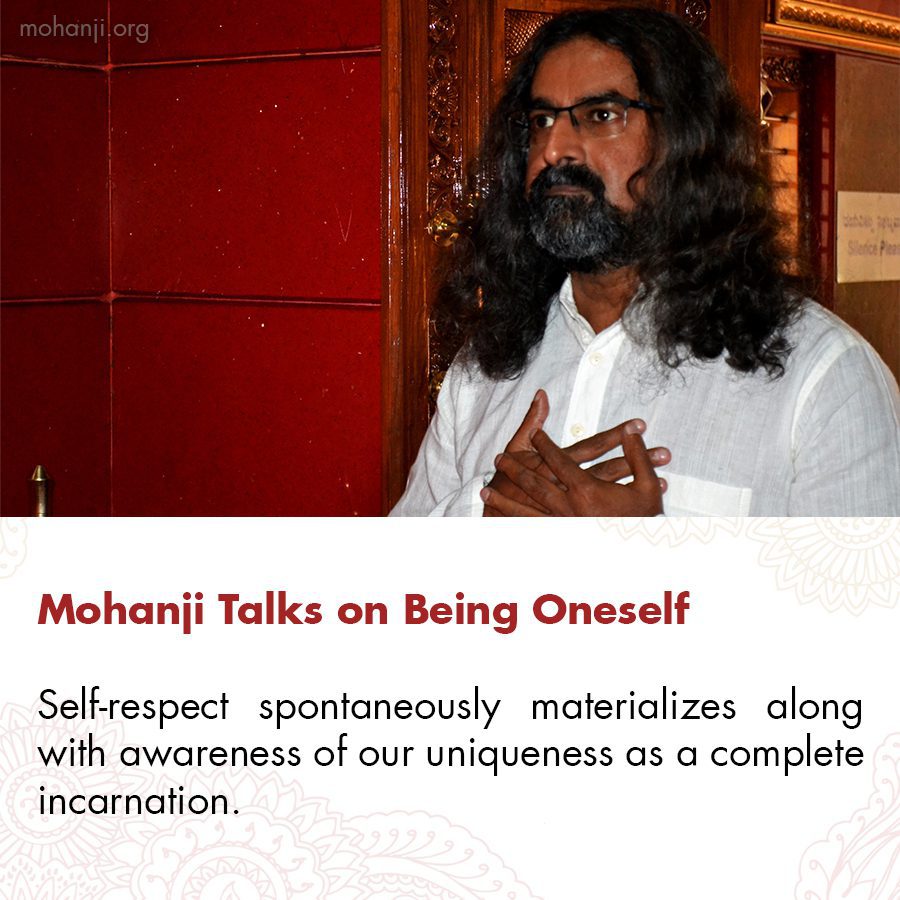
We are good enough, we are unique. Nobody is like us. Our thumb impression is unique to ourselves and our retina is unique to ourselves, and we are unique creations. This has to be accepted, the first and primary step. And that is the moment we start accepting ourselves, we stop competing and stop comparing. Then we start connecting with ourselves with wonder, like a child. Like you know, when a small child is given a toy. The child will be playing, touching the toy and feeling the toy and literally enjoying the toy for a long time. And then it really is fully occupied, full concentration Like that, we have to accept ourselves as a unique creation and start experiencing ourselves with wonder, not as somebody in the society (that is only when we are awake).
There are two things to understand: one is pratheethi and the other is anubhoothi.
Pratheethi means we open our eyes and we see things outside and we connect to those things, and we have an experience.
Anubhoothi means even if you close your eyes, you have that experience inside, you don’t need an object. For example, when you wake up in the morning and you say, ‘Oh, I’m happy, I slept well’, there was no material, there was no person, there was no interaction, but still you’re happy. So we realize that for happiness, you don’t really have to interact with the world. So that kind of awareness takes you to yourself and you start exploring that aspect of yourself. This is all simple awareness that we should have. Awareness. Bodh!
Awareness is the key, when you are aware of yourself and you accept : the 2 A’s (acceptance, awareness.) You do that all the time – when you’re working, when you’re traveling, when you’re sitting in one place, when you’re interacting, just be aware of how you are, what you are, and be fascinated by yourself. So then after a while, you will be fully connected to yourself, and you will be very much linked and happy with yourself. See, all our frustrations, anxieties, insecurities everything is connected to the world outside – all of them will have no value anymore, because we have a lot to see and a lot to feel inside.

And that’s the way we come inside. There are techniques defined by various traditions such as concentrating on the heartbeat, concentrating on the breath, and also assimilating, you are controlling, the pranayama kind of stuff. All those things are there. Anything which is suitable for you is good for you. That’s no problem. But fundamentally, everything should start with acceptance. And there you go, and then be aware. When you’re angry, be aware of the anger, when you’re jealous, be aware of the jealousy. Always be aware but do nothing about it. When you’re constantly being aware, already your witness. You’re taking a step backwards and seeing it. When you are seeing it, that thing loses its intensity. When you are experiencing anger and you’re witnessing the anger, the anger will happen, but you are not angry. This is the difference. So when you take one step backwards and start looking at it, you know that you are actually powerful, you’re not a victim of all these emotions. Instead, you are experiencing all these emotions and you’re still the same, you are completely a witness. This is possible. It takes time, but the first foremost step is acceptance. That is why I keep insisting on acceptance because if we don’t accept yourself; society will not accept us. So this is as simple as that. When you look at the whole society, so many people love you so many people hate you – so you have an element of non-acceptance, which is getting reflected. Whatever you get from society is your own projections. And when that projection ends, then you become a reflection, then the society loves you because they only see themselves in you, they don’t see you. So, there you become lovable. You’re one with the world. You’re part of the world, part of the universe in fact. Everybody enjoys your presence because you are Brightness. You’re like a mirror!!
Questioner: That was a very strong answer! Something I picked up from there was self-recognition, self-appreciation, self-approval. It is so vital to do that, to actually recognize yourself that you are the person you are. That’s awesome. Now it’s interesting, this philosophy, this concept is amazing. I will read the message. I will take home this message. However, to live this message on a day-to-day basis : how strongly do you feel the power of association is? Because if you engage with like-minded people who think this philosophy, live this philosophy, breathe this philosophy, it’s that much easier to be with them in order to think that. Now, can you reflect your message on a day-to-day basis? What to do, how can we make this a part of our life, our breath?
Mohanji: There are two parts to this question; one I feel that we should not detach from anything that comes our way, we must accept. Because when we detach, there are two things happening: one is suppression, other is escapism, and these two are equal to postponement. We should not postpone – we are postponing to some other time. When fears happen, we look into the eyes of fears. When situations happen, accept them. Some situations may not be very easy to accept. If you don’t accept, they hang on, they stay, they persist. So whatever we resist, persists. So I always recommend acceptance in everything: ‘Come, come, we look into the eyes. Bring it on.’ And that makes you free, liberated, because you’re not hiding from anything. You’re not avoiding things, you’re not escaping nor are you trying to manipulate things. It is as it is. We are taking it, as it is.

And secondly, often we can’t avoid many situations in life. For example, workplace situations – one can’t change them. So, being yourself there is the right answer. And always one thing in every situation, we do not have to respond. There are two ways you can interact with a situation. One is to react emotionally, which we usually do – egotistically, emotionally. And the result is usually regret or guilt. Or the other way is to respond using the intellect and just take it easy, take a foot back and look at it and then respond with awareness, and with intellect so that it will not create emotions. These are the two major ways we can interact with society. I always recommend responding, not reacting. Reacting always leaves some bad residue, which is not good. So if you constantly respond, and you have your time, your space and you respond, then you are always light and free. And then you do not have to handle so much of the hangover of regrets or guilt. So that itself saves a lot of time, because we have to handle a lot of all these kinds of things.

So in this society, whatever happens, let it happen. We are not trying to change it. We can’t change it. So we interact in our social life, in our family life, in business life – it’s all one life, but in all the situations we are playing different roles. And in those roles, just be ourselves, keep responding. And our equilibrium, our inner stability, our peace quotient is very vital for us. The peace quotient, and that’s inside us, we already have it. Peace is a state of the soul. Soul is always peaceful whatever emotions we go through. In turbulences, and similar situations, the soul is not affected. So we are coming in contact with our inner core all the time. Or just be reminded that there is a situation inside, which is completely unaffected and try to imitate it. And then we respond and not react. And this is also connected to ownership a lot. Means we own our actions that” I do this , I do this” , this I factor is sometimes very painful. So instead, like what Krishna said, in the Gita,
Yadaa yadaa hi dharmasya
glaanir bhavati bhaarata
abhyutthaanam adharmasya
tadatmaanam srjaamyaham
That is what He said: “I happen”. He did not say, “I take birth”. “I happen”, He says.
Life is about happening. Happening means you are actually happening, or life is as it takes place; not that we have created it. There is of course a history for everything, something has produced a situation and something will happen to the situation; there will be a result, but at the same time everything is sprouting. So we understand that. And we assimilate that, and we accept that. We are not the owner of the action. Ownership of action creates pain, disappointments and also karma. If there’s no ownership, the karmic structure is different. When you do not own it and you are surrendered, (like kaayena vaaccha manasendriyairvaa). And there you are detached from your action, and you’re flowing through. When you are flowing through, you are always free.
And that is what Vyasa said when he ate all the sweets, which the Brajvaasis (residents of Braja) had brought. The Yamuna River was overflowing and Krishna was on the other side. The Brajvaasis said, “We want to cross to the other side but can’t go as no boatman will take us, because the river is overflowing”. Vyasa asked, “What did you bring for Krishna?” They showed him all the sweets and he started eating them. They were embarrassed to tell him not to eat because he was Vyasa. And then Vyasa said, ”Come with me”, and when they reached the shore, he said, “If I have not eaten anything, let the river part”. And the river parted. The Brajwasis went to the other side but were surprised as they knew Vyasa had eaten all the sweets in front of them. Finally they found Krishna sleeping on a bench in the garden, and they waited. And Krishna got up and asked them, “What did you bring?” So they said all these things. Krishna said, “Sorry I can’t eat them because my stomach is full after eating the same things a little while ago”. That means when Vyasa was consuming it, he was offering it to Krishna, and though it was going into the mouth of Vyasa, it was going into the stomach of Krishna. So this is exactly the point.
The point is that if you are absolutely, completely surrendered to existence, then karma cannot take place. The other side I’m saying is that, when we know that everything is happening in life, and you are completely floating through it, like you’re cruising, there will be turbulences, but it doesn’t matter – the ownership and the pain connected will not be present.
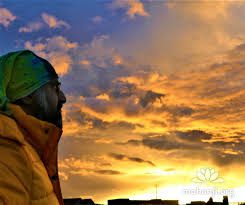
Questioner: This was an amazing tip that you’ve given, and this is why they say that we need a guru who can guide us properly so these are some amazing tips that you should share, thank you very much for sharing !!
Transcribed by Padmini Ravikumar
Proofread by Geetha Iyer
